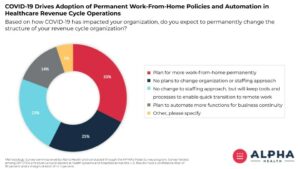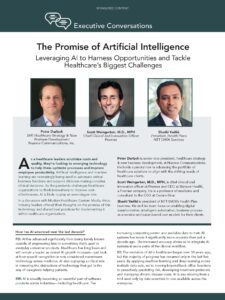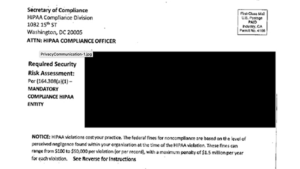Modernizing RCM with AI
Employee productivity, especially during these unprecedented times of many employees working in remote environments, is a top priority for healthcare RCM. The COVID-19 pandemic has spurred many organizations to adopt productivity monitoring software on employee laptops. However, there are some reports that these types of software hurts employee morale and trust. So what is the solution that solves employee productivity concerns while also improving employee morale? How about gamification.
Read MoreThe COVID-19 pandemic has altered the ways healthcare organizations — in particular healthcare RCM — operate, as many businesses shut down office locations and move to remote environments to ensure employee safety and to slow the spread of the virus. While this has altered the way RCM operates from a physical location standpoint, the pandemic has also had an interesting effect when it comes to technology.
Read MoreWe’ve covered many different topics on Modernizing RCM with AI over the past year, providing readers with: Information and education on Artificial Intelligence (AI) and Machine Learning (ML) technologies Insights from industry experts on how to utilize AI and ML Different use cases of healthcare organizations leveraging AI and ML Technologies A topic that many…
Read MoreHaving already announced our client and partner virtual technology conference in late September, OrboGraph has completed it’s speaker line-up for the ORBOIMPACT conference for the afternoons of October 29th and 30th (see agenda here). Day 1 (Thursday, Oct. 29): Healthcare Payments Sessions Day #1 is highlighted by Keynote speaker Mr. Michael Manna at 12:15 PM ET. During the…
Read MoreA survey conducted through the Healthcare Financial Management Association’s (HFMA) Pulse Survey program and sponsored by Alpha Health provides intriguing insights into the direction of the new reality of RCM. The purpose of the survey — conducted between May 19, 2020 to June 22, 2020 — was to assess the impact of COVID-19 on revenue…
Read MoreIn a discussion with Modern Healthcare, three healthcare industry leaders — Peter Durlach, SVP, Healthcare Strategy & New Business Development at Nuance Communications, Inc.; Scott Weingarten, M.D., MPH, Chief Clinical and Innovation Officer at Premier; and Shashi Yadiki, President, Health Plans at NTT DATA Services — provide their insight on leveraging AI to harness opportunities and tackling healthcare’s biggest challenges.
Read MoreThe notion that AI will magically transform healthcare is a bit fantastical, but those who are not familiar with the technologies may imagine a machine replacing a physician or other healthcare worker completely. This misconception is common, and Healthcare IT News reports provides an interesting perspective from an expert panel during the HIMSS & Health 2.0 Europe Digital Conference.
Read MoreThe healthcare industry is fraught with terminology that probably makes your head spin. Not only do you have to deal with the number of acronyms popping up each day, but for revenue cycle management, you also have to learn new terminology when it comes to technology. One of the questions we field on a regular basis: What is the difference between digitization and electronification?
Read MoreWith the myriad of buzzwords and technologies swarming the healthcare industry, especially in revenue cycle management, it have even more difficult for many to understand and identify which technologies are the most useful for their particular business or process. Fear not, we are here to help cut through the clutter and clarify a topic that has cause much confusion: What is the difference between Robotic Process Automation (RPA) and Artificial Intelligence (AI)?
Read MoreAccording to an article on Health IT News, on August 9th, 2020, the Office of Civil Rights (OCR) at the U.S. Department of Health and Human Services sent a warning out to hospitals and health systems on a HIPAA compliance scam involving postcards. The notification notes that OCR is “aware of postcards being sent to health care organizations disguised as official OCR communications, claiming to be notices of a mandatory HIPAA compliance risk assessment.”
Read More








